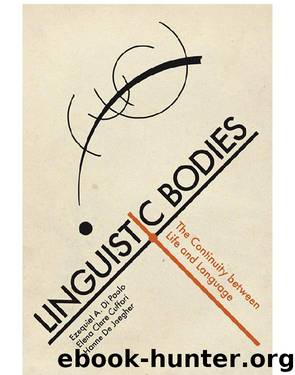Linguistic Bodies by Paolo Ezequiel A. Di; Cuffari Elena Clare; Jaegher Hanne De & Elena Cuffari & Hanne De Jaegher

Author:Paolo, Ezequiel A. Di; Cuffari, Elena Clare; Jaegher, Hanne De & Elena Cuffari & Hanne De Jaegher
Language: eng
Format: epub
Tags: enactivism; embodiment; life-mind continuity; theory of bodies; primordial tension; personal selfhood; constitutive theory of language
Publisher: MIT Press
Published: 2018-10-25T00:00:00+00:00
Sensorimotor and organic bodies are transformed under the socially mediated and reflexive relations linguistic agents enter into to the point of becoming dependent on linguistic skills, broadly construed. Planning and executing complex sensorimotor sequences, organizing memory, using tools, querying experience, and controlling attention are all, in the human case, linguistically organized and regulated. It is telling just how much of a stretch of the imagination is required for the vast majority of us to envision life without language. Breathing is arguably achievable without linguistic mediation, yet it can be regulated by it as in yoga, or controlled practice for swimming or running, or in military training. Eating, securing shelter, caring for illness and injury, managing the care of others, and so on are not typically lived at the human level without language.
With linguistic bodies—such is their constitutive blend, weaving the social and the personal—a new form of autonomy emerges at the community level, that of patterns of utterances, expressions, styles, and open-ended norms. This emergence can be explained partly on the model of the habitus, partly on the thematizing powers of dialogically empowered criticism that promotes social changes in the form of struggles. This new form of social autonomy, the linguistic community, is not only a domain of ways of interacting, but in general of organizing practices and producing subjectivities. It is also a realm where the sense-making of linguistic participants is evaluated and reshaped at all levels in accordance with emerging linguistic norms—that is, norms pertaining to the ongoing individuation of linguistic bodies.
We summarize the second part of the dialectical model in figure 8.3. As can be appreciated, the concepts of linguistic bodies and linguistic communities are not themselves resolutions to the tensions that emerge in the last stage of the model but ways these tensions are manifested and inhabited. The open-endedness, powers, and creativity of linguistic bodies derive precisely from their unfinished, self-contradictory nature, a theme to which we will return.
Figure 8.3 Summary of the second part of the dialectical model. The diagram continues from the end of the diagram shown in figure 7.2 (first part of the model).
Download
This site does not store any files on its server. We only index and link to content provided by other sites. Please contact the content providers to delete copyright contents if any and email us, we'll remove relevant links or contents immediately.
Cecilia; Or, Memoirs of an Heiress — Volume 1 by Fanny Burney(32548)
Cecilia; Or, Memoirs of an Heiress — Volume 2 by Fanny Burney(31947)
Cecilia; Or, Memoirs of an Heiress — Volume 3 by Fanny Burney(31932)
The Lost Art of Listening by Michael P. Nichols(7494)
Asking the Right Questions: A Guide to Critical Thinking by M. Neil Browne & Stuart M. Keeley(5761)
We Need to Talk by Celeste Headlee(5608)
On Writing A Memoir of the Craft by Stephen King(4935)
Dialogue by Robert McKee(4389)
Pre-Suasion: A Revolutionary Way to Influence and Persuade by Robert Cialdini(4224)
I Have Something to Say: Mastering the Art of Public Speaking in an Age of Disconnection by John Bowe(3878)
Elements of Style 2017 by Richard De A'Morelli(3343)
The Book of Human Emotions by Tiffany Watt Smith(3303)
Fluent Forever: How to Learn Any Language Fast and Never Forget It by Gabriel Wyner(3079)
Name Book, The: Over 10,000 Names--Their Meanings, Origins, and Spiritual Significance by Astoria Dorothy(2979)
Good Humor, Bad Taste: A Sociology of the Joke by Kuipers Giselinde(2945)
Why I Write by George Orwell(2945)
The Art Of Deception by Kevin Mitnick(2796)
The Grammaring Guide to English Grammar with Exercises by Péter Simon(2740)
Ancient Worlds by Michael Scott(2682)
